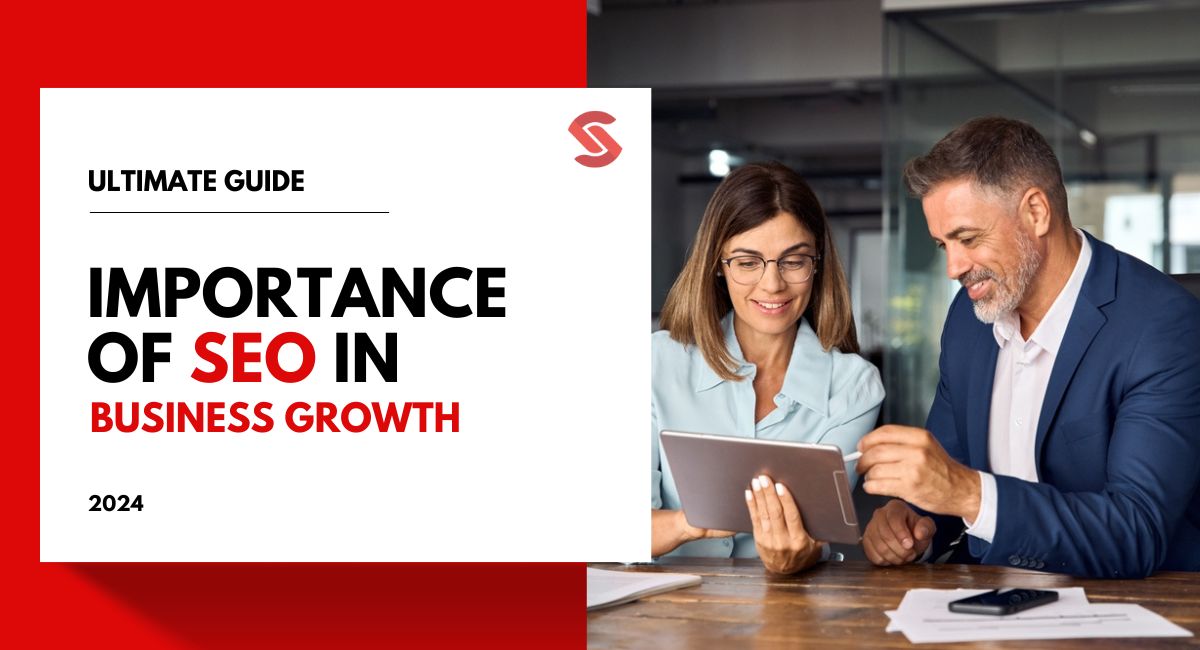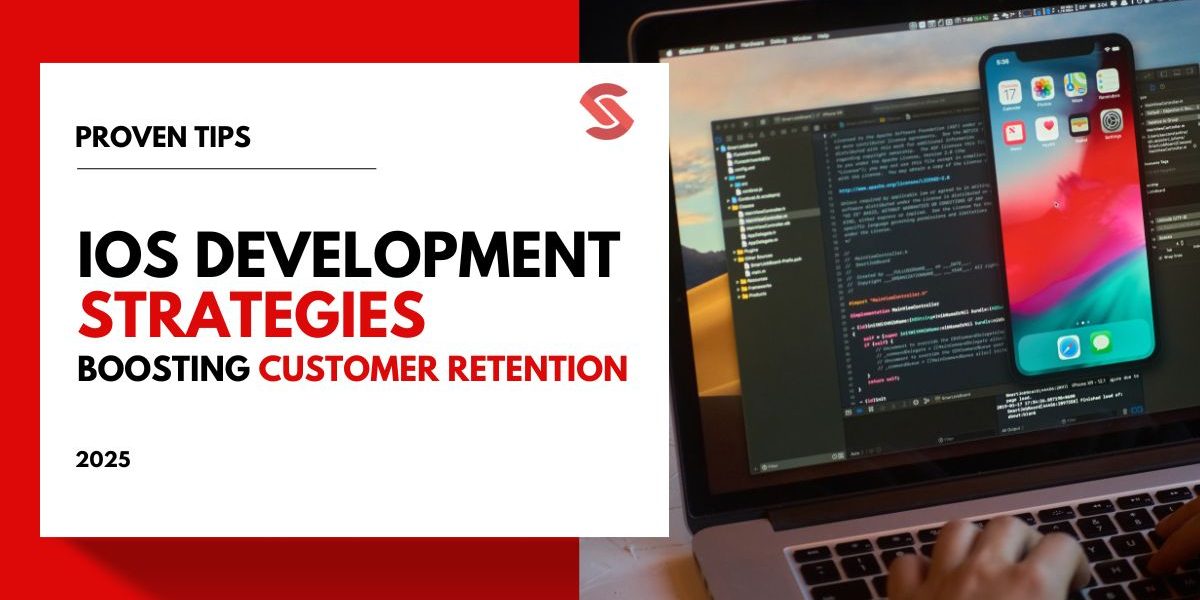If you are a business owner you must have heard about Search Engine Optimization, It’s like a secret recipe that helps your business show up higher on Google and other search engines. But why does it matter for my business? Well according to BrightEdge, about 53% of website traffic comes from organic search results, making SEO services a key player in digital marketing success.
Effective SEO practices can technically increase your online engagement and sales, whether you are a local bakery or a multinational corporation. Isn’t it amazing your website can attract more customers by just implementing effective SEO strategies? So in today’s blog, I’ll be discussing about importance of SEO for your business growth.
How Does SEO Work?
SEO works like a ladder for your website, helping it climb higher on search engine results. Here’s how it starts: Search engines like Google have digital bots called crawlers that roam the internet to find new pages. These crawlers go from link to link, gathering data about each page they visit, which helps them understand what each page is about.
- Crawling: Search engines send out crawlers to find new pages and record information about them.
- Indexing: These pages are then stored in a giant library, called an index, so they can be retrieved later.
Now, when someone searches for something, the search engine decides which pages from the index are most relevant based on several factors:
- Keywords: These are the words people use in their search queries. If your site has relevant keywords, it’s a good match.
- Backlinks: These are links from other websites to yours. More backlinks can make your site look more important to search engines.
- SEO Techniques: This includes optimizing your website’s content and structure (on-page SEO) and building links from other sites (off-page SEO).
By working on these elements, you can enhance your website’s appeal to search engines. This doesn’t just improve your rankings; it ensures that when potential customers search for products or services you offer, your website is one of the first they see. This improved visibility translates into more visitors, and ultimately, more business success.
Why Is SEO So Important for Your Business?
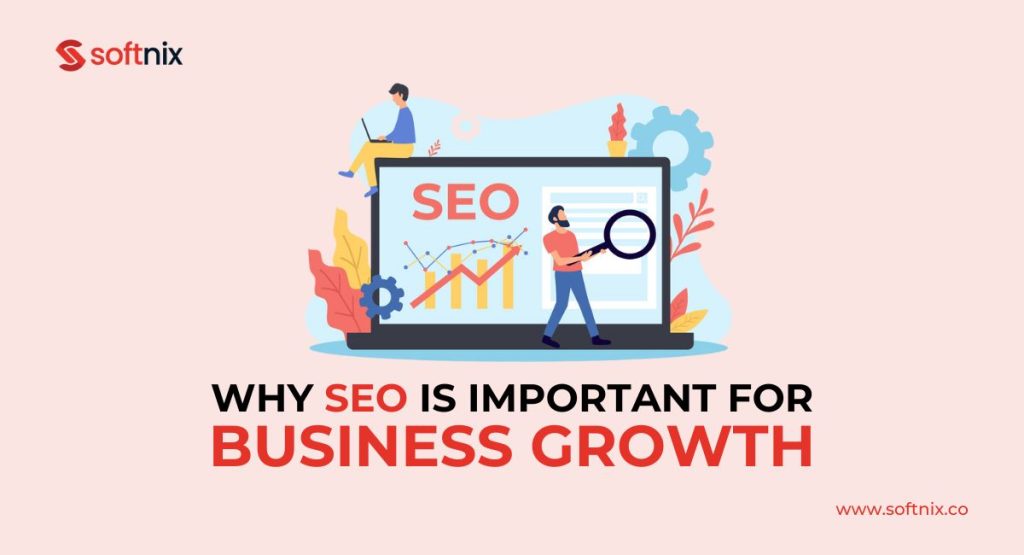
SEO is vital for your business because it boosts your visibility online. When your website appears higher in search results, more customers can find and connect with you. This is essential because most people start their buying journey with a search engine. Therefore, investing in SEO services for your business growth is profitable.
Compared to traditional advertising, SEO is more cost-effective; it doesn’t require continuous spending to maintain its impact like paid ads do. Over time, SEO provides sustainable growth, continually improving your site’s reach and visibility. Investing in SEO services not only increases traffic but also enhances your return on investment, making it a smart choice for long-term business success.
1. Increased Visibility and Organic Reach
When your website is optimized for search engines, it starts appearing higher in search results. This boost in visibility means that whenever users search for products or services you offer, your site is more likely to show up.
As your website becomes more visible, more people click through to it, significantly increasing your traffic. This heightened exposure not only attracts more visitors but also enhances your brand’s presence online, making it easier for potential customers to find and engage with you.
2. Cost-Effective Marketing
SEO proves to be a highly efficient marketing strategy, especially when you consider its return on investment. According to Hubsport, it can leads generated through SEO boast a close rate of 14.6%, which is significantly higher compared to the mere 1.7% close rate achieved through traditional advertising methods like print or TV ads.
This stark contrast underscores SEO’s effectiveness in converting visitors into customers, offering businesses a more cost-effective way to grow their customer base and increase their revenue.
3. Enhanced User Experience
Good SEO makes your website easier to use. When your site is simple to navigate and loads fast, people enjoy using it more. This great user experience helps with SEO too, because search engines rank user-friendly sites higher. They notice when users find what they need quickly and stick around your site. Enhancing your website’s design and mobile responsiveness ensures users have a smooth experience.
So, better usability not only keeps visitors happy but also helps your site climb up in search results, leading to more views and interactions. This focus on user experience ultimately boosts visitor satisfaction and lowers bounce rates, making your website more effective at engaging customers.
4. Long-Term Results and Sustainability
Investing in SEO is like planting a tree that grows roots deep in search engines. Initially, the results may seem slow, but with time, it grows stronger and more substantial, providing lasting benefits. SEO builds up your website’s visibility gradually, ensuring a steady flow of visitors.
It’s a long-term strategy where consistent efforts yield sustained traffic and growth. This approach makes your business more stable and less reliant on fleeting marketing tactics. As your SEO strategy matures, it continues to keep your site highly visible and increasingly relevant.
5. Competitive Advantage
Working SEO gives your business a weapon to fight with competitors. It’s like having the best spot in a race; you start ahead, making it easier to stay in front. By optimizing your site, you are not just seen more online. Your website will appear above others when customers search for products or services you both offer.
This advantage means you grab attention first, increasing your chances of winning business. Staying on top of SEO trends keeps you ahead, helping your business lead in a crowded market.
Here is the bar graph comparing market share before and after implementing SEO strategies.
6. Driving High-Quality Traffic
When you do proper SEO on your website, it helps attract high-quality traffic by targeting the right audiences. When your site appears in search results for relevant keywords, the people clicking through are already interested in what you offer.
This targeted approach leads to better engagement and higher conversion rates. High-quality traffic means visitors are more likely to become customers, bringing better leads and higher sales. By focusing on relevant traffic, SEO ensures your website gets visitors who are genuinely interested in your products or services, boosting your overall effectiveness.
Here is the line graph illustrating the increase in high-quality leads and conversions due to SEO over 12 months.
7. Improving Conversion Rates
Effective SEO directly boosts conversion rates by attracting the right visitors to your site. When people find your site through relevant searches, they are more likely to be interested in your products or services.
Techniques like optimizing keywords, improving site speed, and creating engaging content all help convert visitors into leads and sales. Good SEO practices ensure your website meets users’ needs, leading to increased sales and higher lead conversion. Focusing on these SEO strategies for your business, turns visitors into loyal customers, enhancing your business performance.
8. Building Credibility and Trust
High search rankings boost credibility for businesses. When users see your site at the top of search results, they trust it more. SEO helps build this trust by making sure your site is reliable, easy to use, and full of valuable content.
According to a study by HubSpot 75% of users never scroll past the first page of search results. Consistent high rankings and quality content enhance your reputation, making users more likely to trust and choose your services over others.
9. Increasing Brand Awareness
SEO works well with other marketing efforts, creating a powerful mix for your business. When combined with strategies like social media platforms, email marketing, and PPC services, SEO enhances overall effectiveness. For example, strong SEO improves your site’s visibility, making your social media and email links more likely to be clicked.
An integrated approach ensures that all marketing channels support each other, leading to a cohesive and efficient strategy. This synergy boosts your reach, engagement, and conversion rates, making your marketing efforts more successful and impactful.
Here is the bar chart showing the rise in brand awareness metrics before and after SEO implementation.
10. Increasing Leads and Sales
Investing in SEO services brings a profitable ROI because it helps businesses get more leads and sales by improving online visibility. More potential customers find you when your site ranks higher in search results. These visitors are often ready to buy, increasing the chances of conversion.
SEO attracts the right audience, leading to higher-quality leads and better sales growth. Effective SEO practices, like optimizing keywords and creating valuable content, ensure your site meets user needs. This approach drives consistent lead generation and boosts sales, making your business more profitable and successful in the long run.
Difference Between Paid and Organic Searches (PPC vs SEO)
PPC (Pay-Per-Click) and SEO (Search Engine Optimization) are different search strategies. PPC involves paying for ads to appear at the top of search results, providing immediate visibility but at a cost per click.
SEO focuses on improving your site’s organic ranking over time, offering sustainable traffic without ongoing costs. Use PPC for quick results and SEO for long-term growth and cost-effectiveness.
Here is a table which has a brief comparison between PPC and SEO:
| Feature | PPC (Pay-Per-Click) | SEO (Search Engine Optimization) |
|---|---|---|
| Pros | – Immediate visibility | – Long-term traffic |
| – Quick traffic | – Cost-effective | |
| – Targeted ads | – Builds trust and credibility | |
| – Control over budget | – Improves user experience | |
| – No per-click cost | ||
| Cons | – Costly per click | – Takes time to see results |
| – Temporary results | – Needs continuous effort | |
| – Continuous spending needed | – Algorithm changes | |
| – Click fraud risk | – Requires expertise | |
| Cost | – $1 to $10+ per click, varies by keywords and competition | – Initial investment, ongoing effort, affordable long-term |
| Best For | – Quick results | – Sustained growth |
| – Short-term promotions | – Long-term visibility | |
| – New product launches | – Building brand authority | |
| – Immediate traffic boosts | – Attracting organic traffic |
How To Implement SEO Strategy?
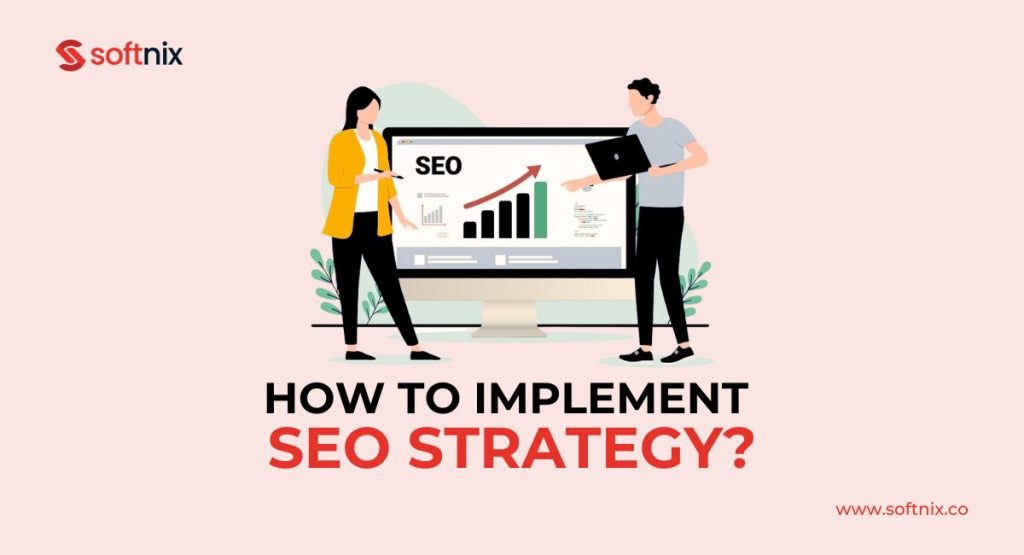
After reading about SEO I bet you must be planning to do SEO on your website but where to start? To create an effective SEO strategy, start with thorough planning. Identify key components like keyword research, on-page optimization, and link building.
Focus on creating quality content and improving site usability. Regularly monitor and adjust your strategy based on performance. This approach helps your business achieve better search rankings and increased organic traffic, leading to sustained growth and improved online visibility.
Keyword Research
To create an effective SEO strategy start with keyword research because it is an essential step in SEO. It helps identify the search terms people use and understand their intent. Using tools like Google Keyword Planner and SEMrush, you can find high-volume, relevant keywords.
This analysis ensures your content targets the right audience, improving your site’s visibility and effectiveness. Understanding keyword intent is crucial because it allows you to create content that meets users’ needs. Good keyword research lays the foundation for a successful SEO strategy, driving targeted traffic and enhancing online presence.
The Importance of Keywords in SEO
Keywords are critical for SEO success. They help search engines understand your content and match it with users’ search queries. Choosing the right keywords involves finding terms relevant to your audience and industry. Effective keyword selection improves your search rankings and attracts targeted traffic. Focus on keywords with high search volume and low competition to maximize your visibility and reach. The right keyword strategy can significantly boost your site’s performance.
Tools and Techniques for Effective Keyword Research
Effective keyword research requires the right tools and techniques. Popular tools include:
- Google Keyword Planner: Provides search volume and keyword suggestions.
- SEMrush: Offers in-depth keyword analysis and competitor insights.
- Ahrefs: Helps find relevant keywords and track performance. Techniques for finding and analyzing keywords include:
- Brainstorming: List potential keywords related to your business.
- Analyzing competitors: See what keywords your competitors rank for.
- Using keyword tools: Find data on search volume, competition, and trends.
Understanding Keyword Intent and Targeting
Keyword intent is crucial for effective SEO. It refers to the purpose behind a user’s search query. There are different types of keyword intent:
- Informational: Users seeking information (e.g., “how to bake a cake”).
- Navigational: Users looking for a specific site (e.g., “Facebook login”).
- Transactional: Users ready to buy (e.g., “buy running shoes”). Targeting keywords based on intent improves user experience and drives relevant traffic. Analyze user behavior and search patterns to align your content with their needs. This strategy enhances your site’s engagement and conversion rates.
Content Creation and Optimization
Creating and optimizing content for SEO involves several key strategies. Write clear, engaging content using targeted keywords to improve search rankings. Focus on SEO copywriting techniques, like using headers and bullet points for readability.
Include multimedia elements like images and videos to enhance user engagement and SEO performance. Regularly update your content to keep it relevant and valuable.
According to HubSpot businesses using content writing services often see a 55% increase in website traffic. This approach boosts your site’s visibility, attracts more users, and encourages better interaction.
Creating Ranking Content
Creating content that ranks well involves focusing on quality and relevance. High-ranking content is informative, engaging, and optimized for target keywords. Effective tips include:
- Use targeted keywords: Research and integrate relevant keywords naturally.
- Optimize headlines and meta descriptions: Make them compelling and keyword-rich.
- Enhance readability: Use short paragraphs, bullet points, and subheadings.
Following these practices improves your content’s chances of ranking higher on search engines, leading to better engagement and visibility.
SEO Copywriting Tips
Optimizing your writing for SEO involves specific techniques. Here are key tips:
- Include keywords naturally: Avoid keyword stuffing; use keywords where they fit contextually.
- Write compelling headlines: Use primary keywords and make headlines attractive.
- Optimize for readability: Use simple language, short sentences, and bullet points.
Common mistakes to avoid:
- Ignoring meta tags: Always optimize meta titles and descriptions.
- Overusing keywords: This can harm readability and SEO performance.
Effective SEO copywriting leads to better rankings and increased user engagement.
Role of Multimedia in SEO
Using multimedia enhances SEO by making content more engaging and interactive. The impact of multimedia includes improved user experience and higher search rankings. Best practices for incorporating multimedia:
- Use high-quality images and videos: Ensure they are relevant and add value.
- Optimize file sizes: This helps improve page load times.
- Include descriptive alt text: This aids accessibility and SEO.
By following these practices, multimedia elements can significantly boost your content’s effectiveness, leading to better engagement and higher rankings.
On-Page Optimization Techniques
Effective on-page SEO techniques are essential for better rankings. Focus on optimizing title tags, meta descriptions, and headers with relevant keywords. Ensure a clean URL structure and easy navigation to improve user experience.
Internal linking is key; link-related content helps search engines understand your site structure. According to Moz, optimizing on-page elements can significantly boost search rankings. Following these practices makes your website more user-friendly and search-engine-friendly.
Optimizing Title Tags, Meta Descriptions, and Headers
Optimizing title tags, meta descriptions, and headers is crucial for better search rankings. Title tags should include primary keywords and be concise yet descriptive. Meta descriptions need to be engaging and contain relevant keywords to improve click-through rates. Headers (H1, H2, H3) should be structured logically, using keywords to help search engines understand the content. According to Moz, well-optimized on-page elements can significantly enhance your site’s SEO performance.
URL Structure and Navigation
Creating SEO-friendly URLs and effective site navigation is key for better user experience and rankings. URLs should be short, descriptive, and include relevant keywords. Proper site navigation helps users and search engines easily find content. Use clear categories and logical hierarchies. According to Google, a well-structured URL and navigation system improves site indexing and user experience, leading to better SEO performance.
Internal Linking Strategies
Effective internal linking boosts SEO by helping search engines understand your site’s structure and spreading link equity. Benefits include improved rankings and better navigation. Best practices:
- Use descriptive anchor text: Make it clear where the link leads.
- Link to relevant pages: Connect related content to guide users.
- Balance links: Avoid too many links on a single page. According to Moz, strategic internal linking enhances user experience and SEO, making your content more discoverable.
Technical SEO Essentials
Optimizing your website focuses on key aspects like mobile optimization, site speed, and security. Ensure your site is mobile-friendly as Google prioritizes mobile-first indexing. Improve site speed for better performance; fast-loading sites rank higher.
SSL certificates are crucial for security, boosting trust and rankings. According to IMPACT, improving site speed can reduce bounce rates by 32%. Prioritize these elements to enhance your site’s technical foundation and SEO.
Importance of Mobile Optimization
Mobile optimization is crucial for SEO because most users browse on mobile devices. A mobile-friendly design improves user experience and search rankings. Best practices include:
- Responsive design: Ensure your site adjusts to different screen sizes.
- Fast loading times: Optimize images and use caching.
- Easy navigation: Make menus and buttons accessible on small screens. Google prioritizes mobile-friendly sites, so optimizing for mobile is essential for better rankings and user engagement.
Improving Site Speed
Site speed is critical for SEO and user experience. Slow sites frustrate users and rank lower. Improve loading times with these techniques:
- Optimize images: Compress files without losing quality.
- Use a Content Delivery Network (CDN): Distribute content globally for faster access.
- Minimize HTTP requests: Reduce the number of elements on your page. Google states that fast-loading sites can reduce bounce rates by 32%, enhancing overall performance.
Importance of SSL
SSL (Secure Sockets Layer) is vital for website security and SEO. It encrypts data between the server and users, protecting sensitive information. Implementing SSL:
- Buy an SSL certificate: From a trusted certificate authority (CA).
- Install and configure: Ensure all site pages use HTTPS. Google gives preference to secure sites, so SSL improves rankings and user trust, making your site both safer and more competitive.
Implement Schema Markup
Schema markup helps search engines understand your content better. It provides structured data, enhancing your site’s visibility. Implement schema markup by:
- Using schema.org: Follow guidelines for different data types.
- Adding JSON-LD format: Embed structured data in your HTML.
- Testing your markup: Use Google’s Structured Data Testing Tool. Schema markup leads to rich snippets in search results, improving click-through rates and rankings.
Submit Sitemaps
Submitting sitemaps to search engines helps with better indexing. Sitemaps guide search engines through your site’s structure. Steps to create and submit sitemaps:
- Generate an XML sitemap: Use tools like Yoast SEO or Screaming Frog.
- Submit to search engines: Upload the sitemap to Google Search Console and Bing Webmaster Tools.
- Update regularly: Ensure new content is included. This process improves indexing, leading to better search engine visibility and rankings.
Resolve Console Errors
Addressing errors reported in the search console is essential for maintaining site health and SEO. Common errors include:
- 404 errors: Fix broken links and missing pages.
- Crawl errors: Ensure search engines can access your site.
- Mobile usability issues: Optimize for mobile devices. Regularly check the search console and resolve issues promptly to maintain high performance and better rankings.
Link Building and Off-Page SEO
Backlinks from reputable sites boost your website’s credibility and improve rankings. Promote content on social media to increase visibility and attract quality links. Business listings on directories like Google My Business enhance local SEO.
According to Moz, high-quality backlinks are one of the top-ranking factors for SEO. These strategies enhance your site’s authority and search engine performance, leading to better visibility and traffic.
Backlinks
Backlinks are external links from other websites to your site, boosting your SEO by enhancing credibility. Strategies for acquiring high-quality backlinks include:
- Creating valuable content: Attracts natural links from reputable sites.
- Guest blogging: Write for other blogs to include links back to your site.
- Outreach campaigns: Contact influencers and bloggers to link to your content. High-quality backlinks improve your site’s authority and search engine rankings, making them critical for SEO success.
Social Media Promotion
Social media promotion boosts SEO by increasing content visibility and engagement. Best practices include:
- Sharing regularly: Post content consistently across platforms.
- Engaging with users: Respond to comments and messages to build a community.
- Using hashtags: Improve the discoverability of your content. Promoting content on social media increases traffic, which can lead to more backlinks and better search rankings, making it an effective SEO strategy.
Search Engine Business Listings
Business listings enhance local SEO by improving your site’s visibility in local searches. Best practices include:
- Claiming your listing: Ensure your business is listed on Google My Business and other directories.
- Optimizing information: Include accurate contact details, hours, and services.
- Encouraging reviews: Positive reviews boost credibility and rankings. Optimized business listings make it easier for local customers to find you, leading to improved local visibility and better search engine rankings.
Tracking SEO Results
Monitoring key performance indicators (KPIs) like organic traffic, keyword rankings, and conversion rates is essential for tracking SEO results. Tools like Google Analytics and SEMrush provide data and insights.
Regularly reviewing these metrics helps refine your strategy for better performance. According to HubSpot, companies tracking their metrics are 17% more likely to see a higher ROI. Accurate tracking offers valuable insights, helping to enhance your SEO strategy and achieve improved search engine rankings.
Key Performance Indicators for SEO
Key Performance Indicators (KPIs) are metrics used to measure SEO success. Essential KPIs for SEO include:
- Organic traffic: Tracks the number of visitors from search engines.
- Keyword rankings: Monitors your position for target keywords.
- Conversion rate: Measures the percentage of visitors who complete desired actions.
- Bounce rate: Indicates the percentage of visitors leaving your site quickly. These KPIs provide insights to improve your SEO strategy and measure success.
Tools for SEO Monitoring
Effective SEO monitoring requires the right tools. Popular tools include:
- Google Analytics: Tracks site traffic and user behavior.
- SEMrush: Provides keyword tracking, backlink analysis, and site audits.
- Ahrefs: Offers comprehensive backlink and keyword analysis.
- Google Search Console: Monitors site performance and identifies issues. Using these tools helps you track, analyze, and optimize your SEO efforts for better performance and insights.
Advanced SEO Strategies for Competitive Edges
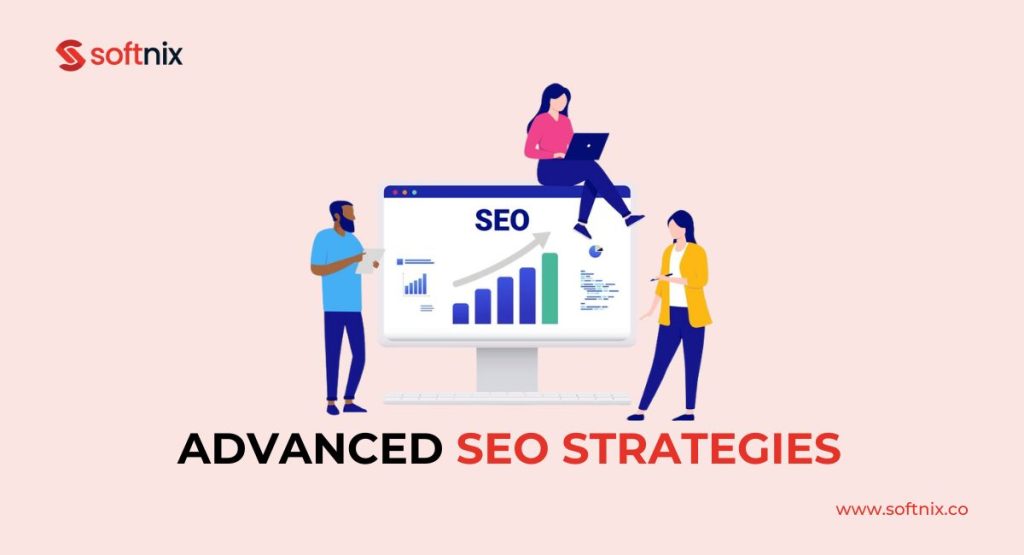
To stay ahead in SEO, use advanced strategies like local and international SEO to target specific markets. Incorporate AI to analyze data and optimize content more effectively. According to Oberlo and Speakergy, as of 2024 around 70 million U.S. households actively use smart home devices, including smart speakers, enhancing the relevance of voice search optimization
Optimizing for voice search as its use is growing rapidly can be great for your higher rankings. These cutting-edge techniques help achieve better rankings and outpace competitors by staying updated with the latest SEO trends.
Harnessing Local and International SEO
Local SEO helps businesses rank better in specific regions, attracting local customers. Techniques include optimizing Google My Business, using local keywords, and gathering local reviews.
For international SEO, focus on hreflang tags, localizing content, and targeting country-specific keywords. These strategies expand your reach and improve both local and global search rankings. Effective local and international SEO enhances visibility in target markets, driving more traffic and engagement.
Leveraging AI and SEO
AI transforms SEO by automating tasks and analyzing large data sets. Use AI tools like chatbots for user engagement and machine learning algorithms for keyword research and content optimization.
AI enhances efficiency and provides better insights, leading to improved SEO results. According to Forbes, AI-powered SEO tools can increase efficiency by 30%, making them essential for staying competitive. AI-driven insights enable more strategic and effective SEO practices.
Optimize for Voice Search
Voice search is on the rise due to the increased use of smart speakers. Optimize content for voice queries by using natural language, answering common questions, and focusing on long-tail keywords. Understanding the impact of voice search in creating SEO strategies is crucial; by 2024, 55% of households are expected to have smart speakers, as reported by Juniper Research.
These practices improve voice search rankings and accessibility, making your content more relevant to modern users. Voice search optimization is essential for capturing the growing number of voice-driven searches.
SEO for Different Types of Businesses
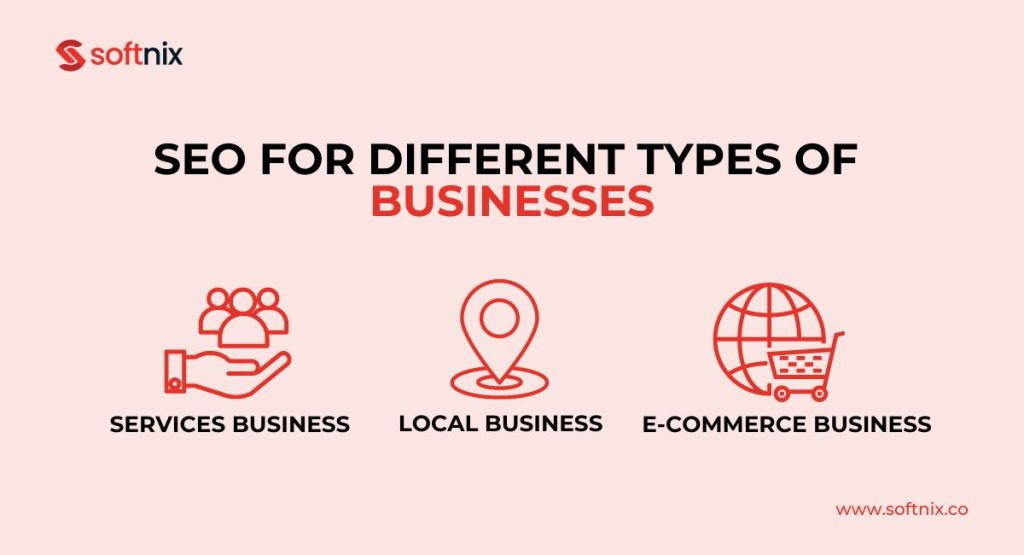
Tailoring SEO strategies for various business models is crucial for success. E-commerce websites benefit from product optimization and user-friendly navigation. Service-based businesses should focus on local SEO and customer reviews. One essential aspect is planning your budget for digital marketing campaigns to ensure effective resource allocation.
Content publishers need to prioritize keyword-rich, high-quality content. According to HubSpot, businesses that tailor their SEO strategies see a 55% increase in organic traffic. These targeted strategies ensure better results by addressing the specific needs of each business type.
SEO for E-commerce Websites
E-commerce SEO faces unique challenges like managing large inventories and optimizing numerous product pages. Best practices include:
- Optimize product titles and descriptions: Use relevant keywords naturally.
- Improve site speed: Faster sites lead to better user experience and higher rankings.
- Utilize high-quality images: Ensure images are optimized for quick loading.
- Implement structured data: Enhance search engine understanding of product details. According to SEMrush, e-commerce sites with optimized product pages see a 32% increase in organic traffic. Tailoring these strategies boosts product rankings and sales.
SEO for Service-Based Businesses
For service-based businesses, local SEO is crucial. Effective strategies include:
- Optimize Google My Business profile: Ensure accurate and detailed information.
- Use local keywords: Include location-specific terms in service pages.
- Encourage customer reviews: Positive reviews boost local rankings.
- Create location-based service pages: Tailor content for each service area. BrightLocal reports that 76% of consumers use online searches to find local services. These techniques enhance local visibility and attract more leads, helping service businesses grow.
SEO for Content Publishers
Content publishers need tailored SEO strategies to optimize articles and blogs. Best practices include:
- Use engaging, keyword-rich titles and headers: Capture attention and improve SEO.
- Create high-quality, valuable content: Focus on in-depth, informative articles.
- Optimize images and videos: Ensure media is relevant and properly tagged.
- Implement internal linking: Connect related articles to improve navigation and SEO. According to HubSpot, businesses that prioritize content SEO see a 97% increase in indexed pages. These strategies boost content rankings and drive more traffic to publisher sites.
How to Find the Right SEO Agency for Your Business?

Choosing the right SEO agency involves several key factors. Consider their past performance and expertise; check case studies and client reviews. Pricing also plays a crucial role; ensure it aligns with your budget and expected ROI. According to Clutch, 75% of businesses say past performance is the most important factor.
But is it worth hiring an SEO agency for your business? According to industry data, focusing on an agency’s proven results is key. This approach can deliver substantial returns by boosting your website’s performance and achieving higher search engine rankings. A well-chosen SEO agency can significantly improve your site’s performance and search rankings, leading to better results.
Past Performance
Reviewing an SEO agency’s past performance is essential for making an informed decision. Look at their track record through case studies and client reviews to understand their successes and challenges.
Assess metrics like traffic increases and improved rankings. According to Clutch, 75% of businesses prioritize past performance when choosing an SEO agency. This evaluation ensures the agency can meet your business goals and deliver desired results.
Area of Expertise
Selecting an SEO agency with relevant expertise ensures they understand your industry’s specific needs. Look for specialization in areas like local SEO, e-commerce, or content marketing.
Examine their portfolio and client list to gauge their skills and knowledge. An agency with specialized expertise can develop targeted strategies, leading to better outcomes. According to HubSpot, businesses partnering with industry-specific experts often see higher ROI.
Pricing
Pricing is a critical factor in selecting an SEO agency. Balancing cost with quality is key to getting the best value. Compare different pricing models hourly rates, monthly retainers, or project-based fees, and consider the value each offers.
Investing in higher-quality SEO services can yield significant long-term returns. Forbes highlights that quality SEO investment often leads to substantial returns. Making an informed decision on pricing ensures you maximize your budget effectively.
Dos and Don’ts of Selecting the Right SEO Agency
| Dos | Don’ts |
|---|---|
| Research Thoroughly: Investigate the agency’s past performance, client reviews, and case studies. Ensure they have a proven track record of success in SEO. | Ignore Red Flags: Avoid agencies with negative reviews, poor client feedback, or a lack of transparent results. |
| Check Expertise: Ensure the agency specializes in SEO relevant to your industry, such as local SEO, e-commerce SEO, or content marketing. | Assume All Agencies Are Equal: Don’t hire an agency without checking if their expertise aligns with your specific business needs. |
| Request References: Ask for and check references from previous clients to get insights into their experiences and results. | Skip the Contract Details: Avoid signing contracts without understanding the terms, deliverables, and potential additional costs. |
| Evaluate Communication: Ensure the agency maintains clear, consistent communication and provides regular updates on progress and results. | Fall for Unrealistic Promises: Be wary of agencies promising guaranteed #1 rankings or overnight success, as SEO is a long-term process. |
| Assess Their Tools: Check what SEO tools and software the agency uses to track and optimize your site’s performance. | Overlook SEO Techniques: Avoid agencies that use black hat SEO techniques, which can lead to penalties from search engines. |
| Understand Pricing: Make sure their pricing structure is clear and matches your budget while considering the value offered. | Choose Solely on Price: Don’t select an agency based solely on the lowest price; quality and experience often come with a higher cost. |
| Set Clear Goals: Discuss and set clear, measurable goals for your SEO campaign to track progress and success. | Neglect Ongoing Evaluation: Don’t forget to continuously monitor and evaluate the agency’s performance and adapt strategies as needed. |
Choose Softnix as Your Trusted SEO Agency
Softnix stands out as the best choice for SEO services due to its proven expertise and track record of success. Our client success stories and case studies highlight significant improvements in traffic and rankings.
Softnix offers unique, custom SEO strategies, ensuring effective results. Trust Softnix for expert SEO services that boost your online presence and drive business growth. Our dedicated team provides a trusted partnership, focusing on delivering measurable SEO results for your business.
FAQs About the Importance of SEO for Businesses
1. What makes Softnix different from other SEO agencies?
Softnix stands out due to its proven track record, client success stories, and tailored SEO strategies. Our expertise in local, international, and advanced SEO techniques ensures effective and measurable results.
2. Why is local SEO important for service-based businesses?
Local SEO helps service-based businesses attract customers from specific regions by optimizing their online presence for local searches. This includes using local keywords, optimizing Google My Business profiles, and encouraging customer reviews.
3. How does Softnix approach e-commerce SEO?
Softnix focuses on optimizing product pages, improving site speed, and utilizing high-quality images. We also implement structured data to enhance search engine understanding and rankings.
4. What are some key performance indicators (KPIs) for SEO?
Essential KPIs for SEO include organic traffic, keyword rankings, conversion rates, and bounce rates. These metrics help assess the effectiveness of your SEO strategy and guide improvements.
5. What role does AI play in modern SEO strategies?
AI transforms SEO by automating tasks, analyzing large data sets, and optimizing content. Tools powered by AI, such as chatbots and machine learning algorithms, enhance efficiency and provide better insights for strategic decision-making.
6. Why is voice search optimization becoming more important?
Voice search is on the rise due to the growing use of smart speakers. Optimizing for voice search involves using natural language, answering common questions, and focusing on long-tail keywords to improve rankings and accessibility.
7. How can businesses ensure they choose the right SEO agency?
Evaluate the agency’s past performance, area of expertise, and pricing structure. Check client reviews, and case studies, and ensure their services align with your specific business needs and budget.
8. What are the benefits of implementing schema markup?
Schema markup helps search engines understand your content better, leading to enhanced search visibility and rich snippets in search results, which can improve click-through rates and rankings.
9. How do internal linking strategies impact SEO?
Effective internal linking improves site navigation, helps search engines understand site structure, and distributes link equity. This leads to better indexing, higher rankings, and improved user experience.
10. What are some best practices for promoting content on social media to boost SEO?
Share content regularly, engage with users, use relevant hashtags, and encourage social sharing. This increases content visibility, attracts backlinks, and improves search rankings.
11. Why is SSL important for website security and SEO?
SSL encrypts data between the server and users, protecting sensitive information and boosting trust. Google gives preference to secure sites, so implementing SSL improves both security and search engine rankings.
12. How does pricing influence the selection of an SEO agency?
Pricing is crucial for balancing cost and quality. While it’s important to stay within budget, consider the value offered by the agency. Higher upfront costs may provide better long-term results, making it essential to choose an agency that offers a good balance of cost and quality.

